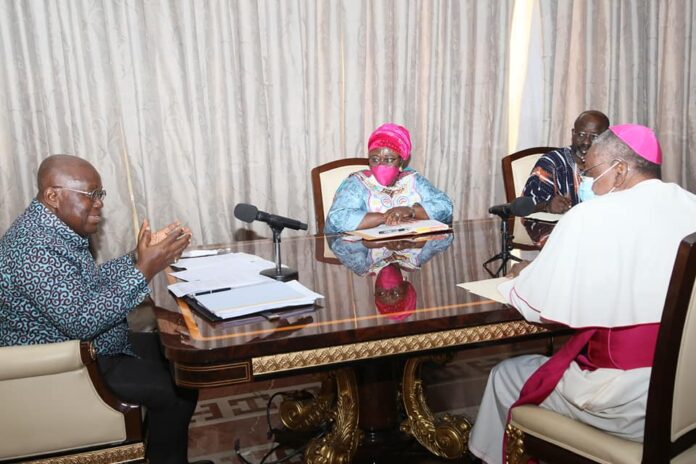|
Getting your Trinity Audio player ready...
|
Despite Africa’s general profile as the zone of greatest growth in global Catholicism, the West African nation of Ghana is reporting significant declines, with many of the losses coming to Christian Pentecostalism.
In a Nov. 13 keynote address to open the 2023 Plenary Assembly of the Bishops’ Conference, Bishop Matthew Kwasi Gyamfi of Sunyani said that the most recent census data suggests that the percentage of Ghanaians identifying themselves as Catholic fell from 15.1 per cent in 2000 to 10.1 per cent in 2021.
The result contrasts sharply with Vatican statistics on the growth of the Church in Africa as a whole. According to figures released last month by the Vatican, Africa registered 5.2 million more Catholics in 2021 than they were in 2020.
Gyamfi said that “available records show that the Catholic population increased steadily from 1880 until 2000 when the Catholic population was 15.1 per cent.”
But it has since been on a downward spiral, dropping from 15.1 per cent in 2000 to 13.1 per cent in 2010, representing 3,230,996 people out of a total population of 24,658,823.
“This figure further declined to 10.1 per cent in the 2021 census, down from 3,230,996 to 3,079,261, meaning that statistically, the Church lost approximately 230,000 of its members within the last 10 to 11 years,” he said. Gyamfi said it marks a “disturbing trend for our church, considering that Our Lord has commissioned us to go to all nations, towns, cities, villages, homes, and families to baptize and teach them.”
Ghana is the second largest country in West Africa with 32 million inhabitants, coming after Nigeria. Gyamfi suggested that rapid urbanization could be at the core of Catholicism’s decline.
In 2012, 52.07 per cent of the population lived in urban areas, a figure which has now reached 58.62 per cent.
“A cursory look at all the census figures reveals a trend which seems to suggest that, while the church appears to post decent percentages in rural communities, it is haemorrhaging most rapidly in the urban centres,” he said. “The census data suggest that when Catholics move from the rural areas to the urban centres, they fail to sustain their Catholic faith and fall prey to other sects. The reasons for this sad phenomenon need to be studied carefully by the bishops and their major stakeholders to find a permanent solution.”
While Catholicism is dwindling in Ghana, the reverse trend is being noticed in what has become known as a “prosperity Gospel” preached mostly by Christian Pentecostals, which observers say has great appeal in a country where 24.2 per cent of the population lives below the poverty line, according to the World Bank.
The proportion of Ghanaians who identified as Pentecostals stood at 24.1 per cent in 2000, a figure which has risen to 31.6 per cent in 2021, according to the same census data. Catholic leaders have proposed a broad range of approaches to reverse the trend, including what they called “an aggressive catechesis.”
“The Church in Ghana must embark on an aggressive catechesis to deepen the knowledge of the lay faithful about the faith. The Church must strengthen and deepen the catechesis offered for the reception of the sacraments, particularly the sacraments of Christian initiation so that the catechesis is not only theoretical but one that leads to the true conversion of the heart and mind of the catechumens,” the bishops’ conference said in a statement.
They also proposed engaging youth in evangelization, cognizant of the fact that young people have been leaving the church in droves. They said Catholic chaplaincies in basic schools and institutions of higher learning ought to be better resourced with trained, competent, and hardworking chaplains.
With increasing reliance on media for information, the bishops said it had become imperative that the church uses both traditional and social media to reach out to the people.
“The conference should, as a matter of urgency, invest heavily in the traditional and social media to go out into the public space as a more effective way of evangelization in our modern world,” they said.
“Certainly, the church in Ghana has to re-orient herself to the urgency of this task so the voice of the church is heard and her message is proclaimed through all the earth.”
“For instance, we have to urgently discuss how to make the Church and her ministers physically and spiritually closer and present in all communities in the urban centres,” said Gyamfi. He explained that it would be critical to vigorously pursue the idea of small Christian communities and “transform some of them into rectorates and parishes.”
Gyamfi insisted that the Church needed to get aggressive in teaching God’s people not to fall prey to the onslaught of the so-called “Prosperity Gospel,” which, he said, “has permeated Ghanaian society and is causing enormous harm, especially to poor, desperate people.”
SOURCE: Cruxnow.com





